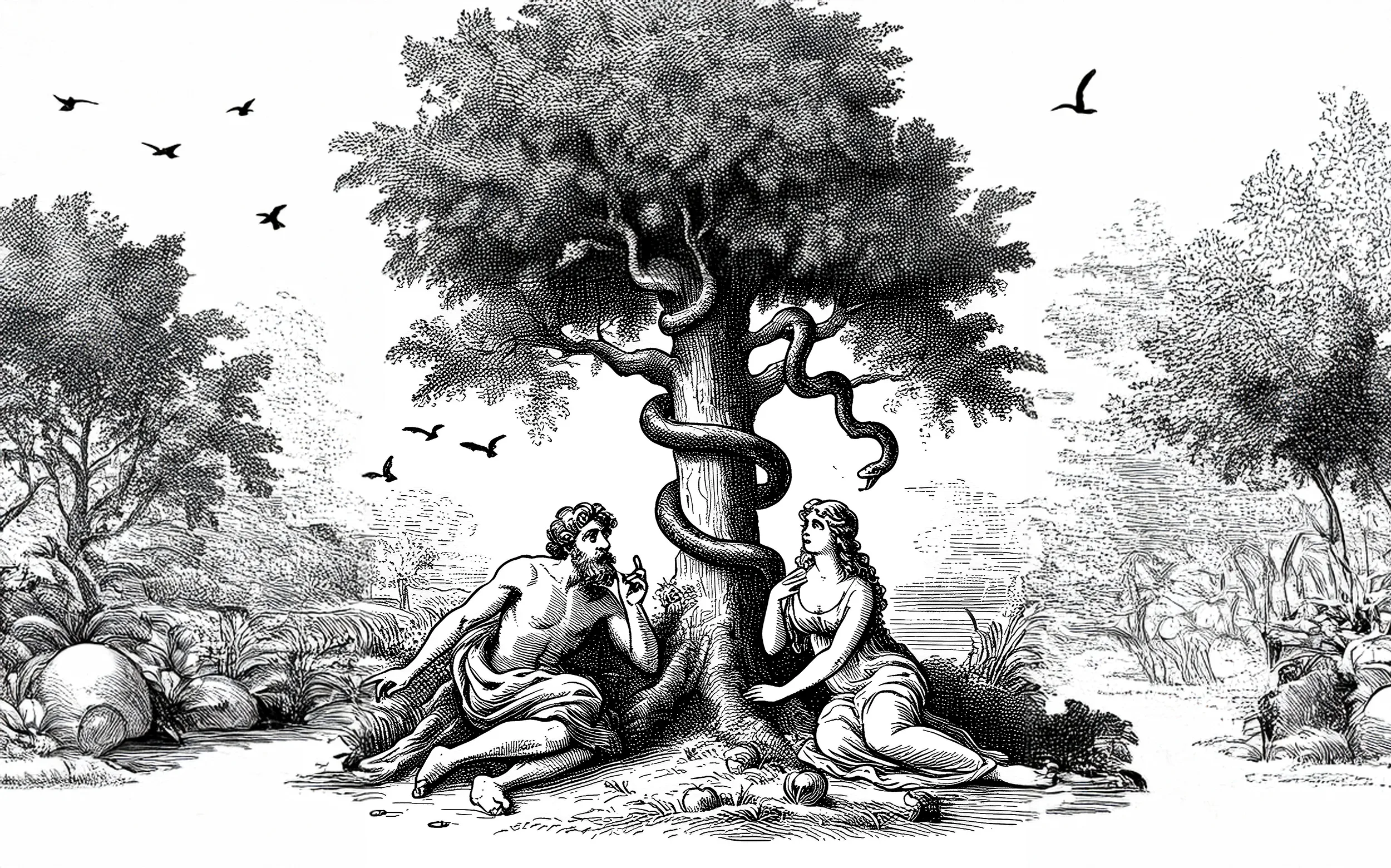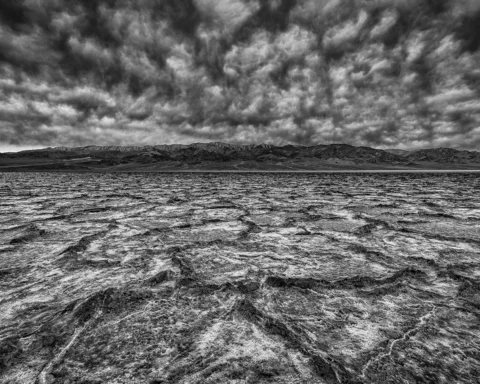ILLUSTRATION BY FIKI. © 2025 ISI.BIBLE
Therefore, just as through one man sin entered into the world, and death through sin, and so death spread to all men, because all sinned. – Romans 5:12
Por tanto, tal como el pecado entró en el mundo por medio de un hombre, y por medio del pecado la muerte, así también la muerte se extendió a todos los hombres, porque todos pecaron. – Romanos 5:12
Man disobeyed God, and sin entered. God placed the first humans, Adam and Eve, in the “garden of Eden” and gave them a few simple rules to obey (Gen 2:8, 15).[1] All they had to do was believe, trust, and obey God (Gen 2:16–17). God also gave man free will to “choose” (Jos 24:15; Deu 30:19; Isa 7:15; Pro 1:22–31; cf. Rev 22:11, 17; Psa 119:30; Isa 65:12; Luk 10:42; Joh 6:67–68) whom to believe and obey (Him or Satan), for without free will, there can be no love.[2] Satan then “tricked” (“deceived”)[3] first Eve, and then Adam, into disobeying God in the Garden of Eden (Gen 3:1–7). While it was Satan who instigated the deception, it was a willful and deliberate choice by Adam and Eve to disobey God (i.e., sin;[4] see Gen 3:6; Rom 5:12, 19).
THE VALLEY OF THE SHADOW OF DEATH
As a result, we now live in a “fallen” (Rev 14:8; 18:2; cf. Mat 7:25; Luk 10:18; 1Ti 3:6; Psa 5:10; 36:12; 57:6; Pro 28:18; Isa 3:8; 14:12; 21:9; Lam 5:16)[5] world into which sin and death have entered (Gen 2:17; Rom 5:12; 1Co 15:21; Jas 1:15). This includes both physical death as well as spiritual death. You mustn’t make the mistake of blaming God for what you see around us today. This fallen world and the reality that we now find ourselves in resulted from Satan’s and man’s actions (Rom 5:12, 19; Gen 3:6); this is not how God initially created this world. God’s initial creation “was very good” (Gen 1:31)—that is, perfect and without sin, suffering, corruption, disease, or death.
We are now, therefore, living in “the valley of the shadow of death”[6] (Psa 23:4; cf. Mat 4:16; Luk 1:78–79; 2:32; Psa 44:19; 107:10–14; 1Co 15:55–57) and “the domain of darkness” (Col 1:13; cf. Mat 4:16; Luk 1:78–79; 2:32; 22:53; Joh 1:5; 3:19; 8:12; 12:35, 46; Act 26:18; Rom 2:19; 2Co 4:6; Gal 1:4; Eph 5:8, 11; 6:12; 1Th 5:4–5; 1Pe 2:9; 1Jn 1:5–6; 2:8–11; Psa 107:10–14; 119:105; Isa 42:6–7; 60:1–3; Mic 7:8), and we are under “bondage” and held “captive”[7] (see Act 8:23; Rom 7:14; Luk 4:18; Gal 4:3; Eph 4:8; 2Ti 2:26; cf. Psa 107:10–11) to sin, Satan, and death.[8] Furthermore, Satan became “the ruler of this world” (Joh 12:31; 16:11; cf. Eph 2:2; 6:12), and he now does everything he can to “trick” and “deceive” you out of inheriting “the free gift of God [which] is eternal life in Christ Jesus our Lord” (Rom 6:23; cf. 1Pe 5:8; Jas 4:7; 2Co 11:3; 1Jn 4:6; Rev 12:9; 20:3, 7–10).
WE ARE ALL SINNERS
We are not born in so-called “original sin”; we (each of us) pursue “evil [sin] from our youth” (see Gen 8:21).[9] Furthermore, we are not being “blamed” for Adam and Eve’s sin (Eph 2:1).[10] While we do inherit their sinful nature[11] (1Jn 2:16; 1Co 15:45–49; cf. Num 11:4, 34; Mat 5:28; Rom 13:14; Gal 5:17, 24; Eph 2:3; Tit 3:3; 1Pe 1:14; 2:11; 4:2–3; Jud 16–18), each of us chooses to commit sin of our own free will after we come of age and are able to know better[12] (Gal 6:5; Rom 1:18–32; Heb 10:26; Mat 12:31–32; Joh 9:41; 1Ti 1:13; 2Pe 3:3; Jas 1:13–15; Jud 16, 18; Rev 22:11; 9:20–21; 16:9; 16:11; cf. Lev 4:2, 13; Num 14:29; Isa 7:16). Therefore, our sins are our own (Jas 1:13–15; Eze 18:20) and result from our own choices, behavior, and actions, not from Adam’s or Eve’s, not because “the devil made me do it,”[13] not because “God made me this way,” or any other excuse. Scripture further tells us, “There is none righteous, not even one,” “for all have sinned and fall short of the glory of God” (i.e., we are all sinners before God; Rom 3:9–20, 23; Gal 3:22; Psa 53:1–3), so please fully realize that you are a sinner, whether you want to think so or not.
Now, even after noting the above, the next thing many will ask or wonder (as I did at first) is this: Hey, I don’t think I’m a sinner! I’m a pretty good person! But I ask you to evaluate your own life and actions honestly. Have you ever in your entire life (even once) lied, cheated, stolen, deceived someone, hurt someone, maybe killed someone, and so on? Those are examples of sins of commission, but there are also sins of omission (see Jas 4:17), which are things you didn’t do but should have, such as helping the needy or poor, standing up for the afflicted, speaking truth in witnessing, and many more. These are all acts of a sinner, yes? Furthermore, did Adam (or the devil) make you do any of those things? No, I didn’t think so.
Moreover, if you’re like me, I bet you can tell very quickly when someone sins against you, right? And they can tell when you’ve sinned against them! And if you’re truly honest with yourself, you cannot really claim that you’ve never in your entire life sinned against someone, can you? And if you can’t even declare that you are sinless in front of man, how much more will you be unable to claim that you are sinless before a holy God, the Lord Almighty, who knows all things, even the hidden things unseen and unsaid (Mar 4:22; Luk 12:2–3; Gal 6:7–8; Rom 1:18; 2:5–6, 16; 14:11–12; Heb 4:13; 1Co 4:5; Dan 2:22; Rev 20:12)![14] So, please be honest with yourself: It’s not Adam (or the devil) who is to blame for your sins, is it? I hope that you see that you are a sinner, as am I. This is a vitally important step before proceeding. A failure to admit (or accept) that you are indeed a sinner stems from pride, and pride leads to death. It’s no shame to admit that you are a sinner, for we all are—every single one of us who has ever lived (except Jesus, as I will explain shortly).
SIN SEPARATES US FROM GOD
We are also told that our sin creates a separation between us and God (Isa 59:2; Eph 2:12; 4:18). Please do not make the mistake of thinking, Well, it’s just a teeny tiny sin, so that can’t separate me from God and keep me from heaven, right? What we see as sin is not what God sees as sin; we grossly underestimate the seriousness and severity of even the smallest sin when compared to an unimaginably holy and just God. What we think is the severity of sin is not what God says is the severity of sin. It is only from what is written in the Word of God that we must come to an understanding of sin.[14a] What we think doesn’t even really matter on the subject; what God says on the subject is all that matters. Wayne Jackson writes:[15]
The Bible clearly teaches that God is an absolutely holy Being (Isaiah 6:3; Revelation 4:8)—i.e., he is utterly separate from evil. His holiness is demonstrated in numerous narratives in the Scriptures. At Sinai, the chasm between God and sinful Israel was underscored vividly (Exodus 19:12–25). The tabernacle arrangement, with its holy place and most holy place (the abode of God [Exo 25:22]) certainly was designed to instruct the Hebrews relative to Jehovah’s holy nature (Exodus 26:33).
The Lord’s holiness not only suggests that he cannot commit sin personally (James 1:13), it also means that he cannot ignore rebellion as if it had never happened. The prophet Habakkuk declared to Jehovah: “Your eyes are too pure to look at evil, And You cannot look at harm favorably” ([Hab] 1:13 [NIV]). God takes no pleasure in wickedness (Psalm 5:4), and those who indulge themselves therein will be recipients of his vengeance ([Psalm] 11:6–7). The Bible affirms that the outpouring of divine wrath on the ungodly is, in fact, a “revelation of the righteous judgment of God” (Romans 2:5; emphasis added).
Sin Separates from God
When humanity chose to sin, it made the decision to be separated from the holy Creator. The prophet clearly stated: “[Y]our iniquities have separated between you and your God, and your sins have hid his face from you” (Isaiah 59:2 [ASV]). In biblical parlance, “death” generally denotes a separation of some sort. When the spirit departs the body, the body is dead (James 2:26). Similarly, when a person enters a state of sinfulness, he becomes spiritually dead (Ephesians 2:1), for, by that act, he has determined to separate himself from God. Remember, the initiation of this estrangement was not forced on us by our Maker; it is totally human responsibility.
We just cannot fully comprehend the true nature and severity of our sin in this fallen world, but one day, we will see all sin for the true abomination and horror that it really is (Rev 6:15–17). The true weight of sin will then be realized and understood by all, even those who claim they don’t need or believe in God (Rom 14:11; Php 2:9–11). Once again, please realize that it is not shameful to admit that you are a sinner before God; He already knows that—He knows all things! It actually takes strength of character, courage, and humbleness of heart (Mat 5:4) to confess that you’re a sinner and to come before God to ask forgiveness. What is truly shameful is remaining in your sins, which is almost always due to stubbornness and pride.[16]
THE PENALTY FOR SIN
God further tells us that the penalty for sin is “death”[17] (1Co 15:56; cf. Gen 2:17; Mat 18:8; Eph 2:1; Jas 1:15; Rom 6:23; 8:2; Rev 2:11), which is also described as eternal separation from God (2Th 1:9; Mat 7:23; 25:41), for only in God can “light” (Joh 1:4–5, 8–9; 3:19–20; 8:12; 9:5; 12:35–36, 46; Act 26:18; 2Co 4:6; 6:14; Eph 5:8; 1Th 5:5; 1Ti 6:16; 1Pe 2:9; 1Jn 1:5; cf. Mic 7:8; Job 12:22) and “life” be found (Joh 1:4; 3:16–17; 5:39–40; 6:33, 35, 47–48, 51, 63, 68; 10:10; 11:25–26; 14:6; Rom 4:17; 6:23; Col 3:4; 1Ti 6:13). Away from Him is only “darkness” (Mat 25:30; Act 26:18; Col 1:13; Jud 13; 2Pe 2:4, 17; cf. Mat 6:23; 8:12; 22:13; Luk 11:34; Joh 1:5; 3:19; 8:12; 12:35, 46; Rom 2:19; 13:12; 1Co 4:5; 2Co 6:14; Eph 4:18; 5:8, 11; 6:12; 1Pe 2:9; 1Jn 1:6; 2:8; Pro 4:19) and “death” (Rev 2:11; 20:6, 13–14; 21:8; cf. Luk 1:79; Joh 5:24; 8:51–52; Act 2:24; Rom 5:12–14; 6:9–10; 1Co 15:21–26, 54–56; 2Ti 1:10; Heb 2:14–15; Jas 1:15; Rev 1:18). Note again that what we think should be the penalty for our sins is not what God says is the penalty for sin (all sin, large or small). What we think about this matter is not relevant; we must go by what God has told us in His Word (the Bible).
Wayne Jackson adds:[18]
Hell: The Ultimate Separation.
Inspiration describes the penalty of hell as “the second death” (Revelation 20:14), which suggests that it is the ultimate separation from God. This is emphasized forcefully in several New Testament passages. In the parable of the virgins, those unprepared virgins who “slept” (i.e., died), when awakened by the coming of the Bridegroom, wanted entrance into his presence, but the door was shut, and they were denied that association (Matthew 25:1–13). Unprofitable servants will be “cast out” and will hear the Lord exclaim: “Depart from me” (Matthew 25:41). Paul expressed it like this. Those who know not God and who obey not the gospel, “shall suffer punishment, even eternal destruction from the face of the Lord and from the glory of his might” (2 Thessalonians 1:9 [ASV]; emphasis added). This abiding separation from God is but a continuation of the estrangement that the rebel cultivated in this life. The Lord is not responsible for such a reckless decision!
The Horror of Separation from God
How is it possible to describe the spiritual state of being banished from the presence of the supreme Being of the universe? Being alienated from Jehovah is the ultimate experience of horror. It is a separation from everything that is pure and good, everything that is right and wholesome, and everything that makes for joy and tranquility. It is, however, a spiritual experience, and since the human mind operates on the plane of the material, we really are not prepared to appreciate the gravity of such a circumstance. Hence, God has employed appropriate symbolism to describe the agonies of hell.
The spiritual abode of the wicked is a state of pain, trouble, and sorrow (Psalm 116:3). It is characterized by shame and contempt (Daniel 12:2) and is a realm of affliction (Jonah 2:2). Hell is a place of outer darkness where there is weeping and the gnashing of teeth (Matthew 25:30)—a sphere of eternal fire (Matthew 25:41) where the “worm” (a figure for gnawing anguish) does not die (Mark 9:48).
The wicked are described as being beaten with stripes (Luke 12:47–48). They are recipients of God’s wrath and indignation, they experience tribulation and anguish (Romans 2:8–9), and they suffer punishment as a manifestation of the Lord’s vengeance (2 Thessalonians 1:8–9). Hell is a place of utter torment, where no rest ever is known (Revelation 14:10–11).
While it would not be an expression of responsible exegesis to literalize the figures of speech cataloged above, one must never forget that the symbolism is designed to emphasize the terror of being abandoned by God. Moreover, the figures doubtless do not do justice to the actual reality of this eternal nightmare.
Lastly, the Bible tells us that God will put an end to sin once and for all. He will not let humanity continue in a state of rebellion forever. While God is holy, loving, and patient beyond measure, He is also just, and He will judge all sin. He will eradicate sin and once again restore His creation to a “very good” state of “Paradise” (i.e., perfect, Gen 1:31; cf. Luk 23:43)—where there is no more sin, suffering, and death (Rev 21:4). This brings us to the coming Great Day of Judgment, discussed in the next chapter.
[1] We don’t always fully understand why some rules are given to us by God, but we must realize that they are for our good and our (eternal) protection because God is a good and loving God (1Jn 4:8; 5:3).
[2] A robot preprogrammed to perform a set of commands is not acting in love.
[3] See the chapter “The Armor of God” and “Beware the Wolves” for “tricked” and “deceived” verse references.
[4] Sin is any disobedience of God, that is, breaking or disobeying His laws (1Jn 3:4; 5:17; Rom 7:7–13). It is also God who defines and tells us what sin is and what is right and wrong, good and evil (wicked), and righteous and unrighteous—not man, his committees, institutions, society, or the world at large. See also the section “The World Is Not Your Shepherd” in the chapter “Changing Your Worldly Habits.”
[5] “Cursed” (Gen 3:17–19; cf. Gen 4:12; 5:29; Rom 5:12; 8:19–22). For something to fall means it no longer occupies a high place it once held, in this case, the initial state of God’s creation; it also means to have rebelled against God (i.e., sinned).
[6] Note: We are to walk through the valley of the shadow of death, not camp out and live there.
[7] Also, “slaves” to sin (see Gal 4:8; Joh 8:34; Rom 6:6, 16–20; 16:18).
[8] Also, “bondage of iniquity” (Act 8:23).
[9] The “original sin” false teaching comes from misinterpreting Psalms 51:5; 58:3, which use symbolic and figurative language.
[10] Note that Ephesians 2:1 says “your sins,” not Adam’s or Eve’s sins; see also James 1:13–15. Note also that while we are not blamed for Adam’s sin, we do suffer the same penalty for it (physical death).
[11] Fleshly, selfish, lustful, prideful, and so on.
[12] We also do not inherit sin from our parents (Joh 9:1–3)—that is a false teaching of man. Scripture is clear we are responsible for our actions and sins after reaching an age of accountability (Rom 1:20; Num 14:26–29; Deu 1:39; cf. Gen 8:21; Jos 24:15; Isa 7:16; 53:6; Rev 22:11). This age isn’t precisely defined, although the age that God used when leading the ancient Hebrews out of Egypt and through the wilderness to the promised land was twenty years old (Num 14:29). Those over the age of twenty were decreed to die in the wilderness for their unbelief (i.e., they were old enough to have known better); those under that age were spared and continued into the promised land. I’m not dogmatic about this particular age, and from what I can read and study on the matter, no one knows the exact age except God. Suffice it to say, at some point, we all reach an age when we know right from wrong, yes? And after that, we are responsible for our own choices and actions. Also, babies and infants go directly into the presence of the Lord in heaven at death. In fact, it will not surprise me if we find out that the number of babies and infants in heaven who have been aborted or sacrificed is greater than the total number of everyone else there saved. This demonstrates the horrific and barbaric cruelty, brutality, hatred, and selfishness of man versus the kindness, love, compassion, mercy, and grace of God and will further glorify God (see Mat 19:30).
See also Wayne Jackson, “Does Psalm 58 Teach ‘Original Sin’?” Christian Courier, https://christiancourier.com/articles/does-psalm-58-teach-original-sin, and Wayne Jackson, “Are Infants by Nature Children of Wrath?” Christian Courier, https://christiancourier.com/articles/are-infants-by-nature-children-of-wrath.
[13] While Satan can entice, trick, and deceive you, he doesn’t make (force) you to actually do anything—you do things because you want to out of lust, pride, greed, envy, anger, revenge, jealousy, and so on (Jas 1:13–15).
[14] God even knows the “motives” behind our actions; see the next chapter, “The Day of Judgment.”
[14a] See the chapter “The Enormity of Sin” in our book Beyond the Tomb.
[15] Wayne Jackson, “Why Would a Loving God Send Us to Hell?” Christian Courier, https://christiancourier.com/articles/why-would-a-loving-god-send-us-to-hell.
[16] When you refuse to admit that you’re a sinner, you are “suppressing the truth in unrighteousness” (see Rom 1:18–32). Furthermore, you are also thereby suppressing (denying) that (1) there is a God (Gen 1:1), (2) He is your Creator (Gen 2:7; 5:1), and (3) you have been made “in the image of God” (Gen 1:27; 9:6).
[17] This includes both physical and spiritual (eternal) death.
[18] Wayne Jackson, “Why Would a Loving God Send Us to Hell?” Christian Courier, https://christiancourier.com/articles/why-would-a-loving-god-send-us-to-hell.






